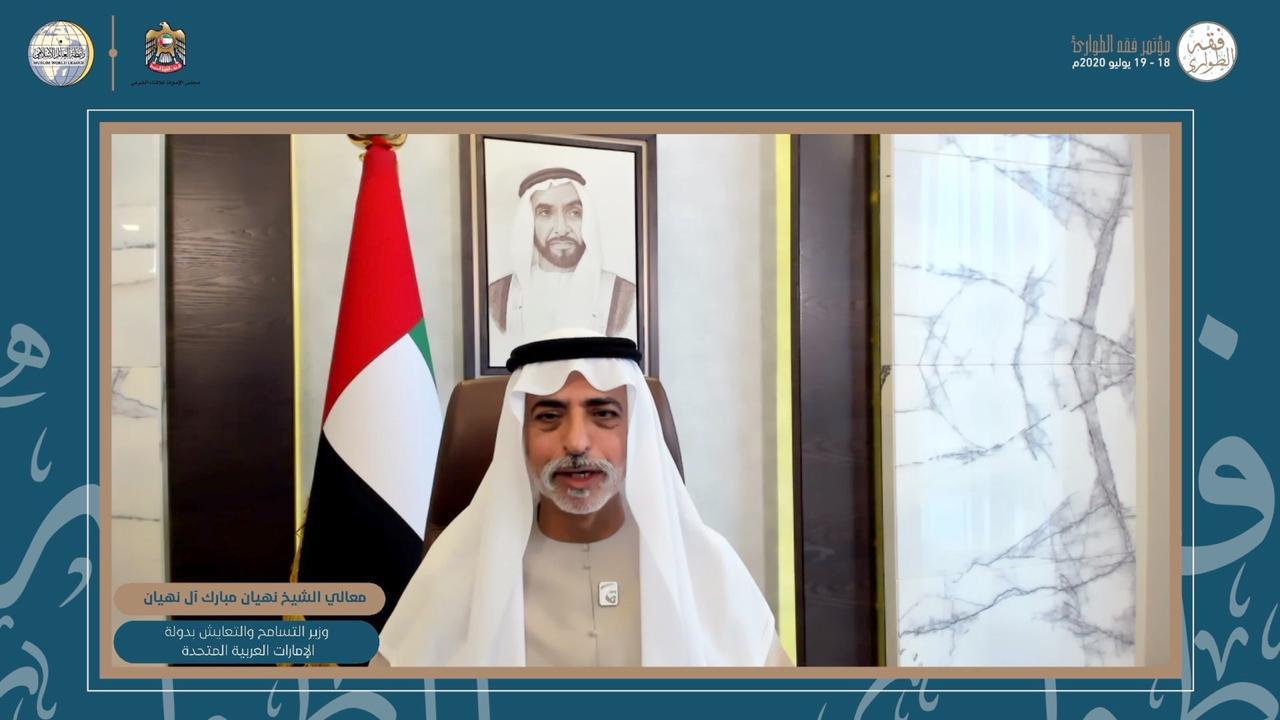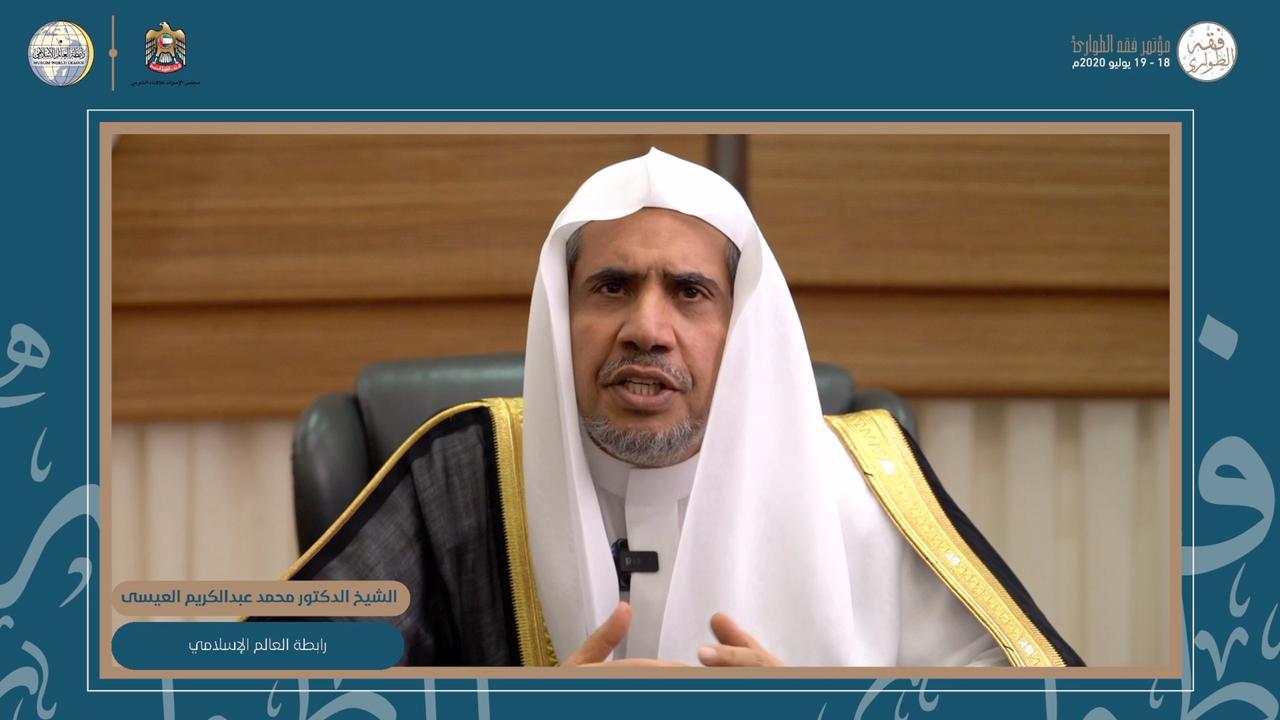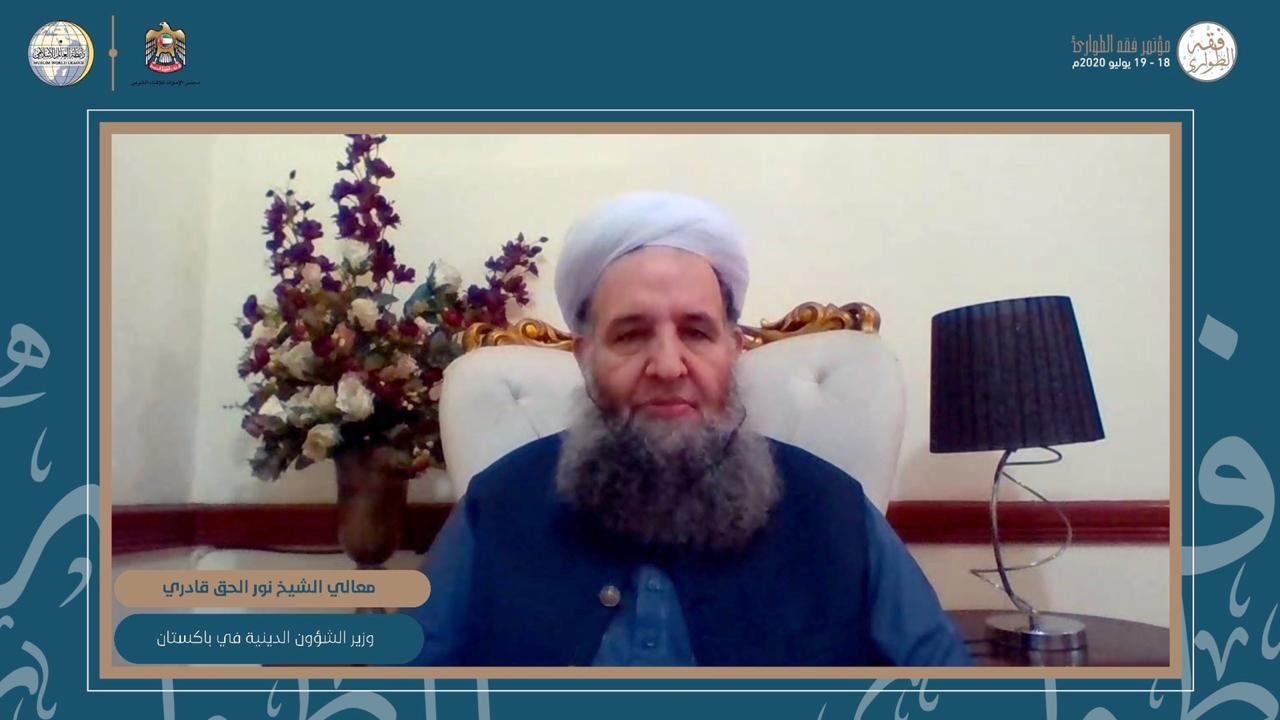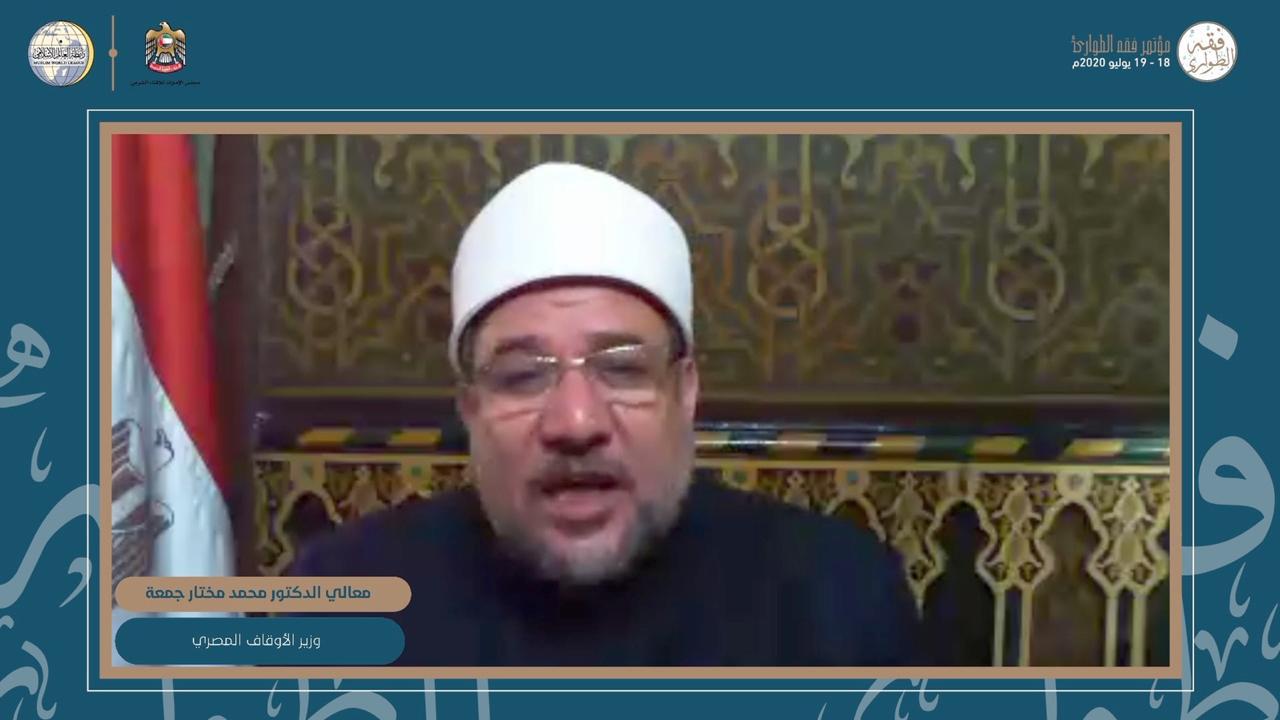The international virtual conference titled "Emergency Jurisprudence Post-Coronavirus" has been organized by the Muslim World League and the United Arab Emirates Council for Fatwa and Sharia to unify the efforts of the nation’s leading scholars, muftis, senior scholars, and Fiqh (jurisprudence) councils in the Islamic world along with Islamic academics and intellectuals around the world.
The Organization of Islamic Cooperation also participated in the conference to explain the provisions of the urgent legal issues that have arisen because of this pandemic.
Sheikh Nahyan bin Mubarak Al Nahyan, Minister of Tolerance in the UAE inauguarated the conference, giving a speech emphasizing the role of Islamic Sharia as a regulator for the general social system. He thanked all participants for their endeavors to continiously highlight the religion as a bulwark for safety and security in the society in general and as guidelines for a given Muslim to achieve his own interests as an individual.

"We are a state, praise be to Allah, proud of Islam as a religion and are more than happy with it. We support this conference which seeks to provide solutions and proposals that enrich the life of the nation, renew its reality, and guide its future," he said.
"Our country is very happy to contribute to the networking and intellectual and real communication between you, for you are the scholars of the nation, and influence the Muslim people everywhere."
The Minister of Tolerance pointed out that the novel coronavirus has had unprecedented effects on all aspects of life, including the relations between nations, people, and on the relationship between humans and God. He added "this conference clearly declares that faith in Allah and holding responsibility, determination and joint efforts in the face challenges are all the sure path to success."
He added, "You are in this conference, but you also emphasize the role of the nation's scholars in supporting the efforts of society and facing emergencies and crises, and you focus on this on the need for the scientific method and human progress to be a basic way to confront this epidemic. As your presence together in this conference is also an important call for regional and global cooperation, in order to overcome problems and preserve public health everywhere".
Al-Nahyan emphasized that the Sharia of Allah calls for unity, fraternity and cooperation in order to achieve the interests of the people, and provides Muslims with an intellectual increase, a legal system, and a spiritual gift that guarantees the individual and society a good and safe life. Embodies before people that the Islamic religion is a pleasure, not a hardship,and that Sharia Fiqhis flexible in its nature, developed in its composition, based on diligence and the implementation of reason, and the introduction of the causes of knowledge, within the framework of the spirit of Sharia, and the essence of religion.
Sheikh Nahyan continued, saying, "We are putting our trust and optimism in this conference, and we expect it to lead to a number of significant fatwas, and to set out mentoring programs that will make Muslim societies able to deal with the effects of this epidemic.We also want you to direct the Muslim individual towards formulating his life affairs in light of the virus according to a rational Islamic approach, and come up with appropriate proposals in the areas of worship, beliefs and transactions, and how to achieve success in managing this emergency crisis, whether in the economic, health, or social fields in general".
Then, His Excellency Sheikh Dr. Muhammad bin Abdulkarim Al-Issa, the Secretary General of the Muslim World League, Chairman of the Association of Muslim Scholars, delivered a speech in which he emphasized that this conference discusses an important topic related to the features of the post-Corona pandemic Fiqh.Because of the multiplication of this Fiqh to include important legal issues, which the latest developments and catastrophes insisted on, and at the forefront, and even the main motivator for holding this conference is the emerging pandemic.

His Excellency said, "Urgent matters of Sharia law have arisen from these matters of worship, personal status and transactions. The pandemic has held Sharia scholars a major responsibility in facing baffledand confused questions and answers.Adding, "and while everyone was happy with the agreement of the scholars under the umbrella of scientific councils, our happiness is indescribable, and I have decided that these councils are determined to meet here on one word in matters of affairs and issues".
His Excellency the Secretary General of the Muslim World League continued, "The motivator of this conference was those urgent questions, outstanding issues, and multiple answers, in the context of a scientific diaspora, which perplexed the respondent. The scholars of the Islamic nation should address these jurisprudential developments, through this forum, explaining the legal ruling in its main issues and branches, in carrying out the legal responsibility, where Allah Almighty chose them to carry the trust and its performance, and they were more worthy of it".
Dr. Al-Issa explainedthat the conference will also address, with this exceptional great gathering, other pressing Sharia laws issues within our Islamic context.
His Excellency concluded by saying, "This pandemic, along with its suffering, carries benefits for people; it has opened up to the horizons and measures that have not occurred to them". Then he thanked Sheikh Abdullah bin Beih, for his active and distinguished contribution, in his efforts for the success of this conference.
Then, Sheikh Abdullah bin Beih, Chairman of the United Arab Emirates Council for Fatwa and Sharia, delivered a speech in which he said, "We meet today while the world is going through a crisis that does not entrust its counterparts, due to the outbreak of the new epidemic of coronavirus.Millions wereinfectedby covid-19, and it claimed the lives of many thousands, and it continues to spread;it still threatens countries that have been endowed with regeneration. It has been classified and labeled as pandemic by the World Health Organization".
He added, "We are meeting today and our bodies have diverged, but our hearts converged. We meet in the first juristic conference of this kind to study the results of the crisis and its effects". Stressing that the view of this conference stems from the awareness that there is a party should not overlookor left out what is going on, and it is the point of Fiqh, which consists of classes, laws, philosophy and spirituality.
His Excellency Sheikh Bin Bayah continued: "Indeed, you scholars in the official fatwa institutions, in your mosques and schools have confronted the new developments that the new reality imposed by the established mechanisms of fatwa and curricula, and in accordance with local contexts". Pointing out that the Muslim World League, led by His Excellency Sheikh Dr. Muhammad bin Abdulkarim Al-Issa, was the first in every unifying and renewing effort. As His Excellency spared no effort or spared energy in gathering the nation’s scientific energies and inviting leaders of opinion and thought to deepen unity and closer ties for the benefit of the Islamic and human nation.
He added, "In this matter, we have had an effort in the United Arab Emirates Council for Fatwa and Sharia to issue a set of fatwas and statements to clarify the legal position on a number of key practical and contractual issues. The Council also played its guiding role in keeping up with the general policy of the United Arab Emirates and its pioneering practical vision in addressing the crisis".
Sheikh Bin Bey praised the measures taken by the government of the Kingdom of Saudi Arabia, which are legally and in a position to care for the Two Holy Mosques, which are the holiest places, by implementing measures to avoid disasters and sanctify sanctity in the face of crisis. Stressing that it is necessary to adhere to and abide by the government of the Custodian of the Two Holy Mosques, based on its sovereign and legal responsibility to care for pilgrims and visitors, and to help them in preserving the health and safety of all.
Sheikh Bin Bayah added, "The decision issued to allocate pilgrims this year to pilgrims inside and to reduce the number of pilgrims is in the interest of Muslims because they may face the risk of disease spreading among them in light of the continuance of the corona pandemic. Hajj precautions are a correct discipline in Sharia standard and the correct scientific methodology.
He continued: "The vision of our country, the United Arab Emirates, in facing this crisis, was marked by the anticipation of planning and firmness in its application. It is a vision based on the value of human dignity and generosity, as it raised the matter of human life, health and comfort, and did not spare any effort or saved money for that. This vision is also based on the value of innovation, so the UAE participated with the world in developing advanced treatments and taking advantage of brains and the latest experiences, so it benefited citizens and residents from the most advanced treatments and the most advanced tests".
Then, His Excellency Sheikh Noor Al-HaqqQadri, Minister of Religious Affairs of the Islamic Republic of Pakistan, delivered a speech in which he addressed the repercussions of the coronavirus worldwide.

He said, "Muslims in the Islamic world and elsewhere do not do anything except based on the fatwa of scholars and jurists, and since the outbreak of this virus in the world, the centers of fatwas, juristic councils and senior jurists have addressed to clarify the Sharia laws of various emerging issues about the Corona pandemic. These fatwas, as issued by official institutions charged with advisory opinion by the government administration, were also issued by independent muftis with their followers, or by Islamic religious parties and societies that took it upon themselves to issue fatwas to their audiences. These fatwas varied according to the diversity of Islamic schools of thought, the difference in ijtihad and its origins within these different schools of thought, but all of them have great value and importance in developing Islamic Fiqh".
He added, "The beautiful thing that we have seen is the commitment of the majority of Muslims to orders. They realized that the one, who issued the fatwa prohibiting something, wanted the good for all the Muslims".
For his part, Egyptian Minister of Endownment, Dr. Muhammad Mukhtar Gomaa, emphasized that the fatwas (legal Islamic opinions) that have been issued in dealing with the coronavirus pandemic showed the urgent need to think beyond "narrow horizons."
Rigid ideas coming out of such "narrow horizons" were voiced by some of those affiliated with the religious discourse, maintaining certain Islamic provisions without considering that Islamic Fiqh takes into account the circumstances of time and place, the conditions of people and the developments and trends of every era.

"More than ever, we have become in urgent need to properly understand [religious] text through scientific and logical rules. Moreover, we need a transition from the approaches of memorization and indoctrination to approaches of comrehension and analysis in our curricula, programs, scientific writings and media discourse. At the same time, it is indispensable to return to our scientific roots in the principles of jurisprudence and fundamentals while also benefit from modern science. Useful science is the kind of absolute science that benefits people in the affairs of their religion and their lives. As the people of knowledge in every science and art are the people who are specialized in it," the Egyptian minister said.
After that, the conference sessions started on its first day, discussing the topic "Rooting the Fiqh of Emergency" in the first session. In the second and third sessions, the topic of the area of worship, and the topic of "distinguished efforts of Islamic countries in dealing with the corona pandemic" in the fourth session.
Comments
Leave a Comment